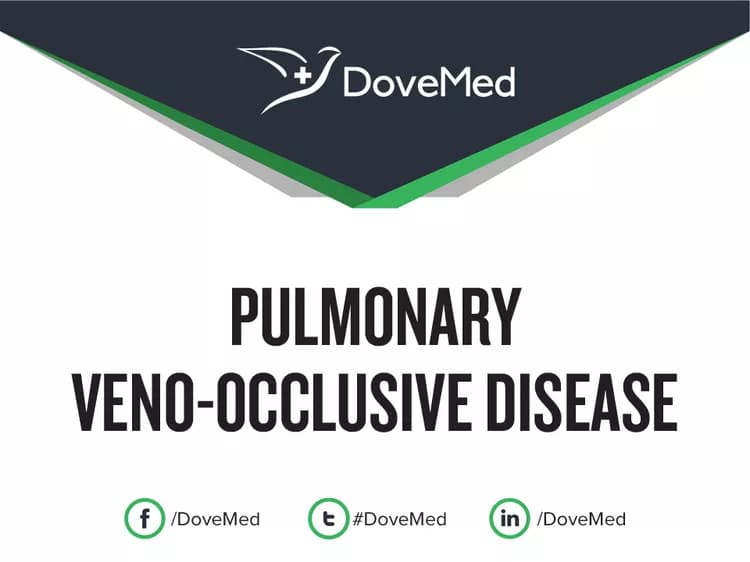What are the other Names for this Condition? (Also known as/Synonyms)
- Pulmonary Venoocclusive Disease
- PVOD (Pulmonary Veno-Occlusive Disease)
- Veno-Occlusive Disease of Lung
What is Pulmonary Veno-Occlusive Disease? (Definition/Background Information)
- Pulmonary Veno-Occlusive Disease (PVOD) is a rare condition that causes pulmonary hypertension (high blood pressure) in the lung arteries. The high blood pressure occurs in the pulmonary arteries that are connected to the right side of the heart
- The exact cause of PVOD is unknown. It is believed to be associated with blood cancers, such as leukemia and lymphoma, and bone marrow transplantation and chemotherapy
- Common signs and symptoms of Pulmonary Veno-Occlusive Disease are shortness of breath, coughing-up blood, fatigue, and fainting. This condition commonly occurs in young adults with a slight male predominance
- There are no effective treatment and preventative measures available for Pulmonary Veno-Occlusive Disease. The prognosis of PVOD is poor, especially when it occurs in infants
Who gets Pulmonary Veno-Occlusive Disease? (Age and Sex Distribution)
- Pulmonary Veno-Occlusive Disease can occur at any age ranging from 8 weeks (newborns) to the 7th decade of life. Most cases of PVOD though occur in young adults
- There is a slight predominance of males, with male to female ratio of 2:1
What are the Risk Factors for Pulmonary Veno-Occlusive Disease? (Predisposing Factors)
- The main risk factor of Pulmonary Veno-Occlusive Disease is a family history of the condition (particularly the presence of PVOD among siblings). This leads to an early onset of the condition, within the first 3 decades of life
It is important to note that having a risk factor does not mean that one will get the condition. A risk factor increases ones chances of getting a condition compared to an individual without the risk factors. Some risk factors are more important than others.
Also, not having a risk factor does not mean that an individual will not get the condition. It is always important to discuss the effect of risk factors with your healthcare provider.
What are the Causes of Pulmonary Veno-Occlusive Disease? (Etiology)
The exact cause of Pulmonary Veno-Occlusive Disease is unknown, but in most cases it is believed to be associated with the following conditions:
- Viral infection
- Genetic factors
- Immune-mediated conditions such as lupus (SLE)
- Blood cancers such as leukemia and lymphoma
- Chemotherapy
- Bone marrow transplantation
What are the Signs and Symptoms of Pulmonary Veno-Occlusive Disease?
Common signs and symptoms associated with Pulmonary Venoocclusive Disease include:
- Shortness of breath on exertion
- Fatigue
- Cyanosis (bluish skin discoloration)
- Hemoptysis (coughing-up blood)
- Syncope (fainting) in later stages
How is Pulmonary Veno-Occlusive Disease Diagnosed?
The diagnosis of Pulmonary Veno-Occlusive Disease may include a complete evaluation of medical history along with a thorough physical exam. During a physical examination (including listening to the heart and lungs with a stethoscope), the physician may look for:
- Increased pressure in the neck veins
- Clubbing of the fingernails
- Swelling in the legs
- Bluish skin discoloration
Following diagnostic tests are generally carried out:
- Blood oximetry - to check oxygen concentration in blood
- Arterial blood gases - to check oxygen concentration and acid base status of the body
- Chest CT scan
- Chest x-ray
- Echocardiogram
- Lung function test, which can help evaluate the functioning status of the lungs
Many clinical conditions may have similar signs and symptoms. Your healthcare provider may perform additional tests to rule out other clinical conditions to arrive at a definitive diagnosis.
What are the possible Complications of Pulmonary Veno-Occlusive Disease?
Complications associated with Pulmonary Veno-Occlusive Disease could include:
- Progressive breathing difficulties
- Pulmonary hypertension (high blood pressure in the pulmonary arteries_
- Right-sided heart failure
How is Pulmonary Veno-Occlusive Disease Treated?
Currently, there is no cure available for Pulmonary Veno-Occlusive Disease. However, the following medications can be helpful:
- A vasodilator drug may be administered to widen the blood vessels
- Drugs that can help control the immune system, such as steroids, may be given
- Supplemental oxygen may be used to reduce pulmonary artery hypertension
How can Pulmonary Veno-Occlusive Disease be Prevented?
Currently, Pulmonary Veno-Occlusive Disease is a condition that cannot be prevented.
What is the Prognosis of Pulmonary Veno-Occlusive Disease? (Outcomes/Resolutions)
- Pulmonary Veno-Occlusive Disease has poor prognosis, particularly in infants, in whom the survival period may be about a few weeks
- In adults, the survival period may range from a few months to a few years
Additional and Relevant Useful Information for Pulmonary Veno-Occlusive Disease:
- Pulmonary hypertension means a high blood pressure in the (main artery of the) lungs. This should not to be confused with systemic hypertension, otherwise known as ‘high blood pressure’
The following article link will help you understand pulmonary hypertension:
http://www.dovemed.com/diseases-conditions/pulmonary-hypertension-ph/
Related Articles
Test Your Knowledge
Asked by users
Related Centers
Related Specialties
Related Physicians
Related Procedures
Related Resources
Join DoveHubs
and connect with fellow professionals


0 Comments
Please log in to post a comment.